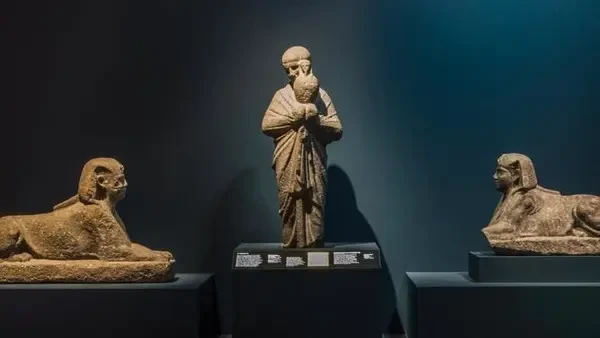National Authority for Remote Sensing supports the use of smart agriculture to improve the quality of agricultural crops
- Smart agriculture contributes to increased productivity
and reduces water use, fertilizers and pesticides
- The success of the experience of smart agriculture in many countries of the
world
- Participation of the Remote Sensing Authority in rehabilitation efforts for
approximately 4 million acres
The Minister of Higher Education and Scientific Research, Dr. Ayman Ashour,
stressed the importance of continuing to direct scientific research and studies
towards smart agriculture in view of its connection with increasing
agricultural productivity and reducing production costs, noting the political
leadership ' s interest in this important issue, which will contribute to Egypt
' s food security.
The Minister referred to the decision of the President of the Arab Republic of
Egypt to approve the sub-agreement between the Government of the Arab Republic
of Egypt and the Government of Canada on the implementation of the project to
promote climate smart agriculture and agrobiodiversity; and to enhance the
resilience of rural communities most affected by climate changes in the old and
new Nile and Egypt at $10 million.
For his part, Dr. Islam Abu Al-Magd, Chairman of the National Authority for
Remote Sensing and Space Sciences, stressed the importance of smart farming,
which contributes to increasing agricultural production and reducing production
costs and seeks to make use of modern technologies to improve the quality of
agricultural crops, thereby contributing to self-sufficiency in crops and
supporting State efforts in land rehabilitation.
Dr. Islam Abu Al-Magd explained that smart farming is a system that relies on
advanced technology to grow food in sustainable and clean ways and to
rationalize the use of natural resources, particularly water. One of its most
notable features is its reliance on information management and analysis systems
to make the best possible production decisions, at the lowest costs, as well as
the automation of agricultural processes such as irrigation, pest control, soil
control and crop control, pointing out that smart farms have a real potential
to provide more productive and sustainable agricultural production based on a
more efficient approach to resource use.
For his part, Dr. Abdelaziz Bilal, Head of the Division of Agricultural
Applications, Soils and Marine Sciences of the National Authority for Remote
Sensing and Space Sciences, noted that smart agriculture means remote control
of additions or inputs to agricultural production; to achieve sustainable
development goals, through food security to increase production in the unit of
area, noting that the State undertakes horizontal and vertical agricultural
expansion, emphasizing that smart agriculture contributes to increased
production, reduces costs and reduces waste in the use of water and
fertilizers.
Smart agriculture needed space because it used an electronic technical system
and the use of the Internet of objects and artificial intelligence techniques
to define "system" with all the needs of the land in which the smart
farming system would be applied, which in turn would reduce water use, reduce
fertilizer and pesticides and improve the quality of agricultural crops, rather
than following traditional farming methods.
Dr. Abdelaziz Bilal reviewed the role of the National Remote Sensing Authority
in smart farming. The Authority is collaborating with the Ministry of
Agriculture on the horizontal land reclamation project. This contributed to the
rehabilitation of some 4 million acres in cooperation with the General
Authority for Reconstruction Projects of the Ministry of Agriculture. Through
the use of remote sensing techniques, the Authority has implemented several
important projects. The most important of them are the implementation of a
project in which remote sensing is used to track wheat crops and to determine
suitable irrigation dates and the extent to which a portion of the crop is
infected with pests. In addition, a project was carried out in cooperation with
the Electronics Research Institute to produce a smart irrigation system that
can be used in several agricultural crops, as well as the development of a
system to reduce the use of water in rice cultivation funded by the Academy of
Scientific Research and Technology.
Dr. Abdelaziz Bilal emphasized that modern technology was working to achieve
food security and helping to reduce cost, noting that the initial cost that
some might see as relatively high would be offset by later lower production
costs, as well as by improving the quality of agricultural crops, which could
be self-sufficient in crops, noting that the successful application of smart
agriculture in many different countries of the world had contributed to
increased agricultural productivity.
Dr. Islam Abu Al-Magd, Chairman of the National Authority
for Remote Sensing and Space Sciences, emphasized the significance of smart
farming in increasing agricultural production and reducing costs. He
highlighted the system's reliance on advanced technology, information
management, and automation of agricultural processes, such as irrigation, pest
control, and crop control, which can lead to more productive and sustainable
agricultural production.











